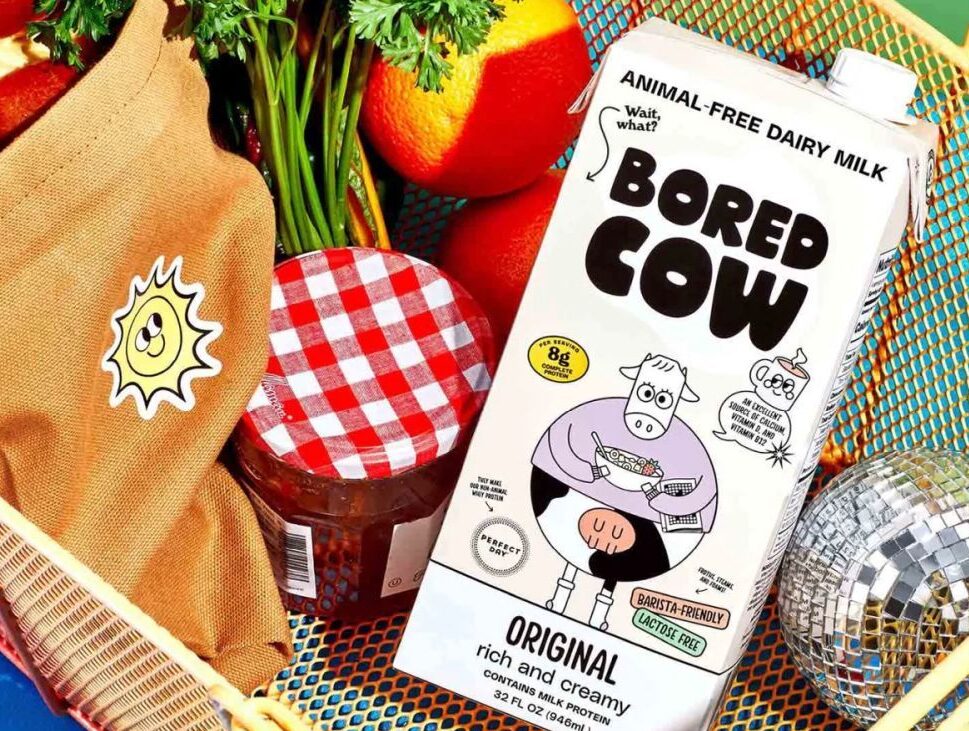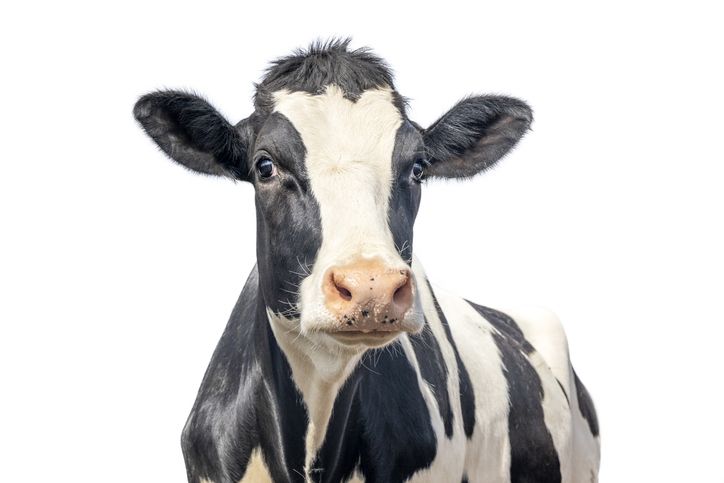The whey protein (β-Lactoglobulin) that foodtech startups such as Perfect Day are making with microbes in fermentation tanks is bio-identical to the bovine version. But if you mix it with water, oil, sugar, gums, vitamins and minerals and put it in a carton, can you call the end product ‘animal-free dairy milk’?
The answer—according to the National Milk Producers Federation (NMPF), which represents US dairy farmers—is a hard ‘no.’
In a letter to FDA commissioner Dr. Robert Califf mailed on June 26, NMPF president and CEO Jim Mulhern highlighted new brand Bored Cow, which recently launched in US natural foods retailer Sprouts. Labeled as ‘animal-free dairy milk,’ Bored Cow ‘milks’ contain whey protein from fermentation.
Other beverages containing Perfect Day’s whey protein use slightly different terms, with a test product from Nestlé deploying the term ‘animal-free dairy beverage,’ while Strive Nutrition is trialing the term ‘animal free milk.’
While such products might contain milk protein, they do not meet federal standards of identity for ‘milk,’ which limit the term to the “lacteal secretions” of “healthy cows,” according to the NMPF.

NMPF: It would be much more accurate to label it as a ‘synthetic whey beverage’
“It is baseless, preposterous and absurd” to call Bored Cow products ‘milk,’ said NMPF president and CEO Jim Mulhern. “It would be much more accurate to label it as a ‘synthetic whey beverage.’
“Milk is a natural, biologically produced, highly complex and nutritious food” containing 400+ fatty acids, eight types of whey protein and four types of casein proteins, vitamins, minerals, and “countless other bioactive compounds.”
Taking just one of these proteins (β-Lactoglobulin) and adding some sugar, sunflower oil and other ingredients does not make dairy milk, he argued.
“Like the plant-based labeling fiasco that’s bedeviled regulators for more than four decades, we are beginning to see the presence of mislabeled synthetic food products in the marketplace masquerading as natural foods. It’s imperative that FDA take action now, before this situation spins out of control.”
Asked what the NMPF wants the FDA to do, communications chief Alan Bjerga told AgFunder News (AFN): “We’d like to see FDA enforce its standard of identity for milk, which clearly defines milk as the product of an animal.
“These products don’t need to be banned, but the labeling needs to be clear that these beverages come nowhere near duplicating the complex structure of actual fluid milk and should not imply that these are dairy products.”
Attorney: FDA standards of identity only apply to unadorned term ‘milk’
However, Nigel Barrella at law firm Barrella Law PLLC said it was imperative that products such as Bored Cow be labeled as ‘dairy’ products, given that they “contain actual milk proteins, and consumers who are allergic to milk can have the same, potentially life-threatening, reaction to these products.”
As for the term ‘milk,’ he said, “FDA standards of identity are for the unadorned term [ie. ‘milk’]. Once you modify that term, whether with ‘plant-based’ or ‘animal-free,’ it is apparent that it is a different product. In this case, Bored Cow simply does not represent itself to be THE standardized food (‘milk,’ or more precisely, whole cow’s milk without added vitamins).”
Rebecca Cross, founding partner at law firm Greenfare Law LLP, told AFN that “for the purposes of allergen labeling, the FDA actually requires the term ‘milk’ to be used on the labels of these products, and it said so in recent guidance [section B14, which suggests allergen warnings such as ‘contains milk-derived protein’].”
She added: “What I think is actually misleading is that most cow’s milk does not meet the standard of identity for ‘milk’ [the lacteal secretions of healthy cows] as cows raised on concentrated feeding operations, who suffer from conditions like mastitis, cannot credibly be described as healthy.”
Good Food Institute: ‘The inclusion of the word milk on these product labels aids consumer understanding’
Madeline Cohen, senior regulatory attorney at The Good Food Institute, took issue with the NMPF’s use of the term ‘synthetic’ to describe Perfect Day’s whey protein, meanwhile. “Products made with animal-free whey contain real milk protein, not a synthetic substitute.
“Furthermore, consumers clearly understand the term ‘milk’ to convey certain information about the taste, texture, and uses of a product. The inclusion of the word ‘milk’ on these product labels aids consumer understanding, rather than hindering it.”
Bored Cow: We’re following FDA draft guidance
Bored Cow’s brand owner Tomorrow Farms said it was “confident” in its labeling, which it claimed “follows the recent FDA draft guidance on the labeling of plant-based milk alternatives.” This stipulates that the term ‘milk’ on plant-based products is acceptable if they match the nutrition of cow’s milk and include qualifiers such as ‘almond’ or ‘plant-based’.
According to Tomorrow Farms, Bored Cow contains 8g protein per serving (to match dairy milk) and added calcium, potassium, vitamin A, D2, B12, and B2.
“While the NMPF is doing its best to stifle innovation,” the firm told us, “We trust consumers to make their own judgments.”
What is ‘milk’?
FDA standards of identity define the unqualified term ‘milk’ as the “lacteal secretion, practically free from colostrum, obtained by the complete milking of one or more healthy cows.”
According to plant-based brands, such standards of identity were designed to address fraud and economic adulteration, not to prevent plant-based alternatives from using the standardized term ‘milk’ altogether.
Courts handling false advertising cases over plant milks have tended to agree, arguing that the federal standard of identity for milk does not categorically preclude a company from giving food products names that include the word ‘milk’ such as ‘almondmilk’ or ‘soymilk.’
The FDA has not specifically weighed in on the term ‘animal free dairy milk,’ however. AFN reached out to the agency for comment and was sent the following response: “In February 2023, the FDA issued draft guidance to help ensure appropriate labeling of plant-based products that are marketed and sold as alternatives to milk (plant-based milk alternatives, or PBMA). In addition, the FDA will issue draft guidance to industry on the labeling of plant-based alternatives to animal-derived foods as outlined in our priority list of guidance topics.”
Animal-free dairy?

The term ‘animal-free’ has steadily gained traction to describe dairy, egg, and meat proteins made by genetically engineered microbes in fermentation tanks instead of by animals. But recent research suggests it may not be the optimal term as some consumers assume ‘animal-free’ means plant-based.
The term “kind of took off,” said Allison Fowler, chief marketing officer at Perfect Day, which makes dairy proteins in bioreactors via precision fermentation.
“For some consumers, ‘animal-free’ can sometimes be conflated with plant-based,” she told AFN in a recent interview. This is potentially problematic, however, given that Perfect Day is making real dairy proteins that must come with a milk allergen warning. The company now recommends that customers consider the term ‘whey protein from fermentation,’ said Fowler.
Further reading:




